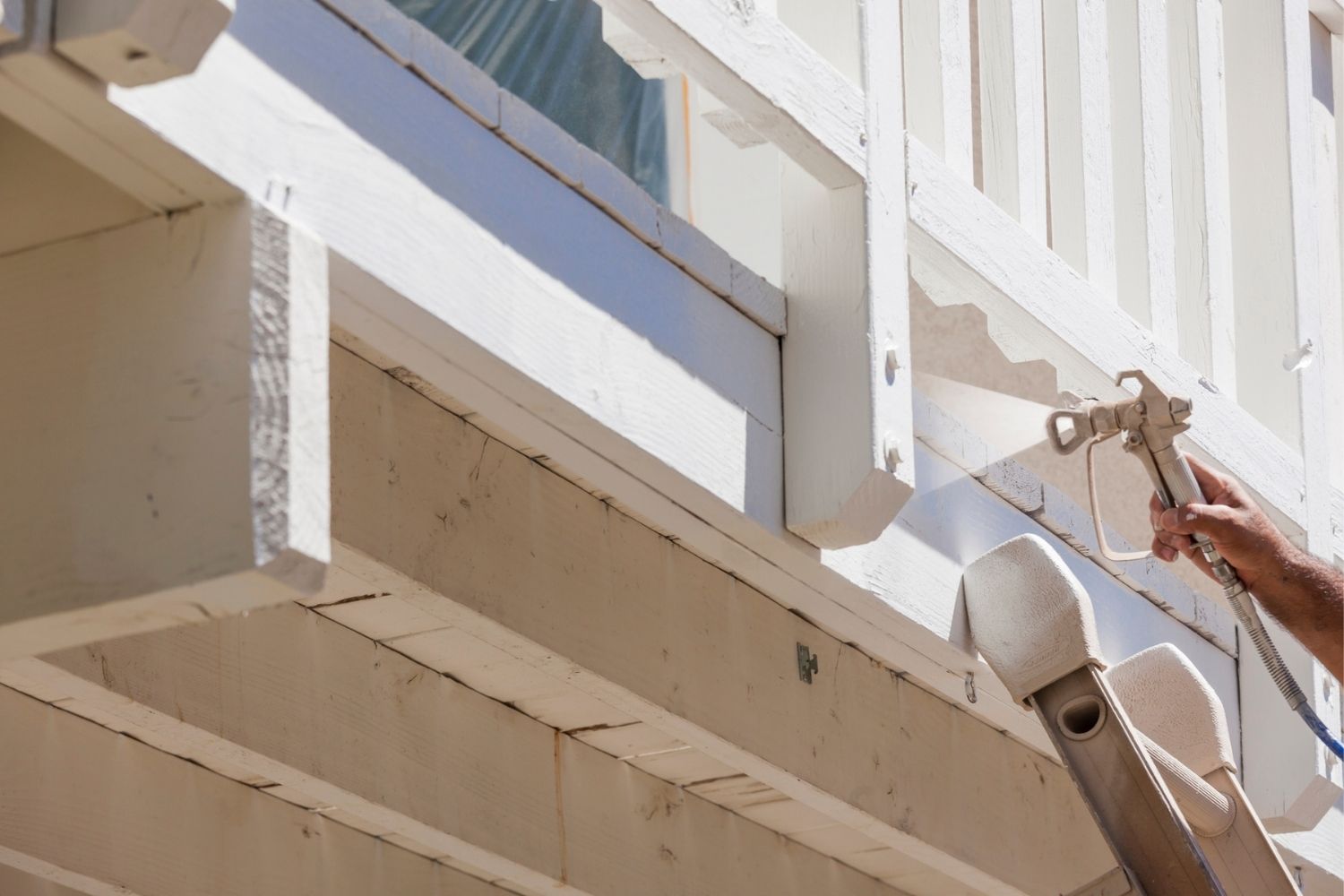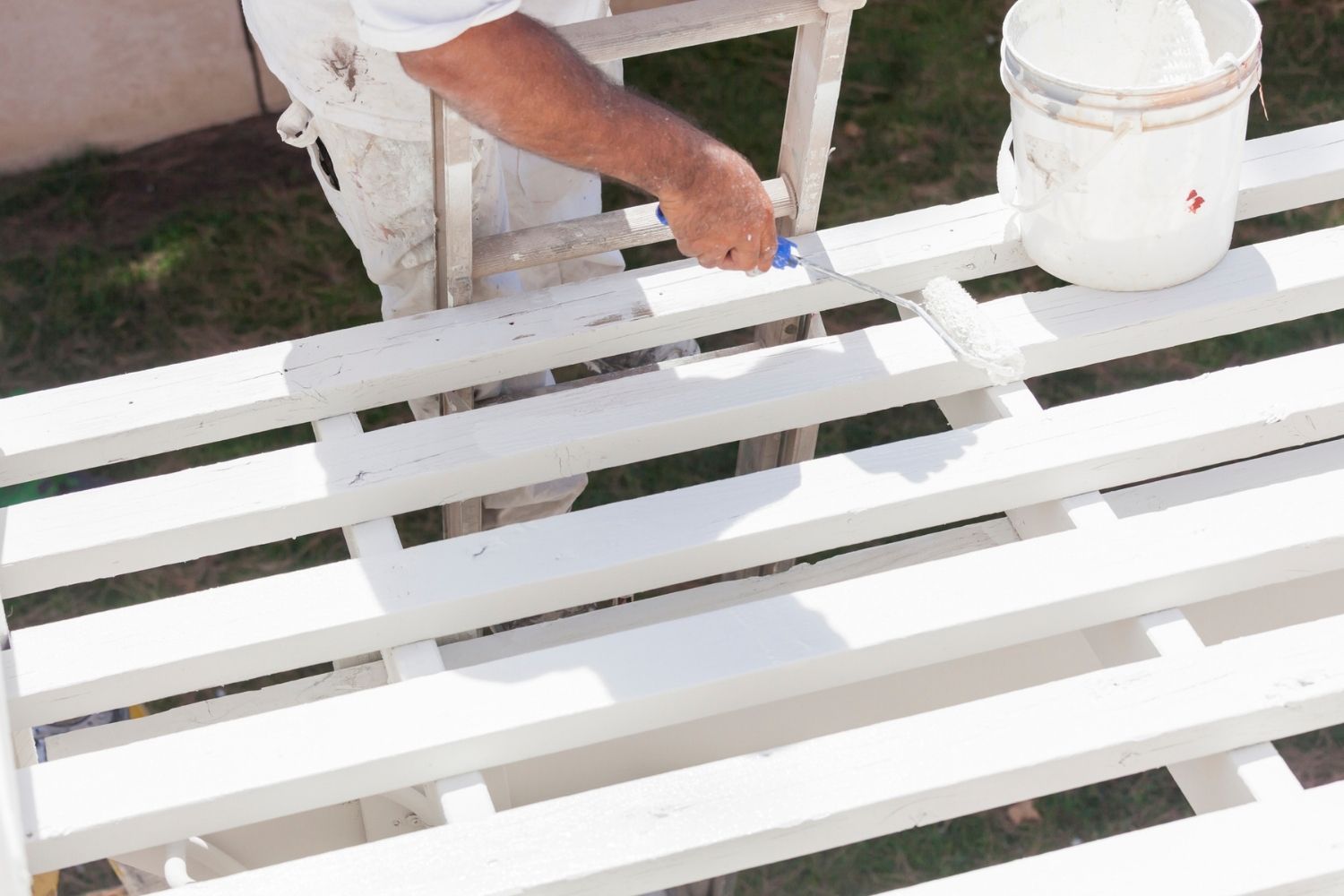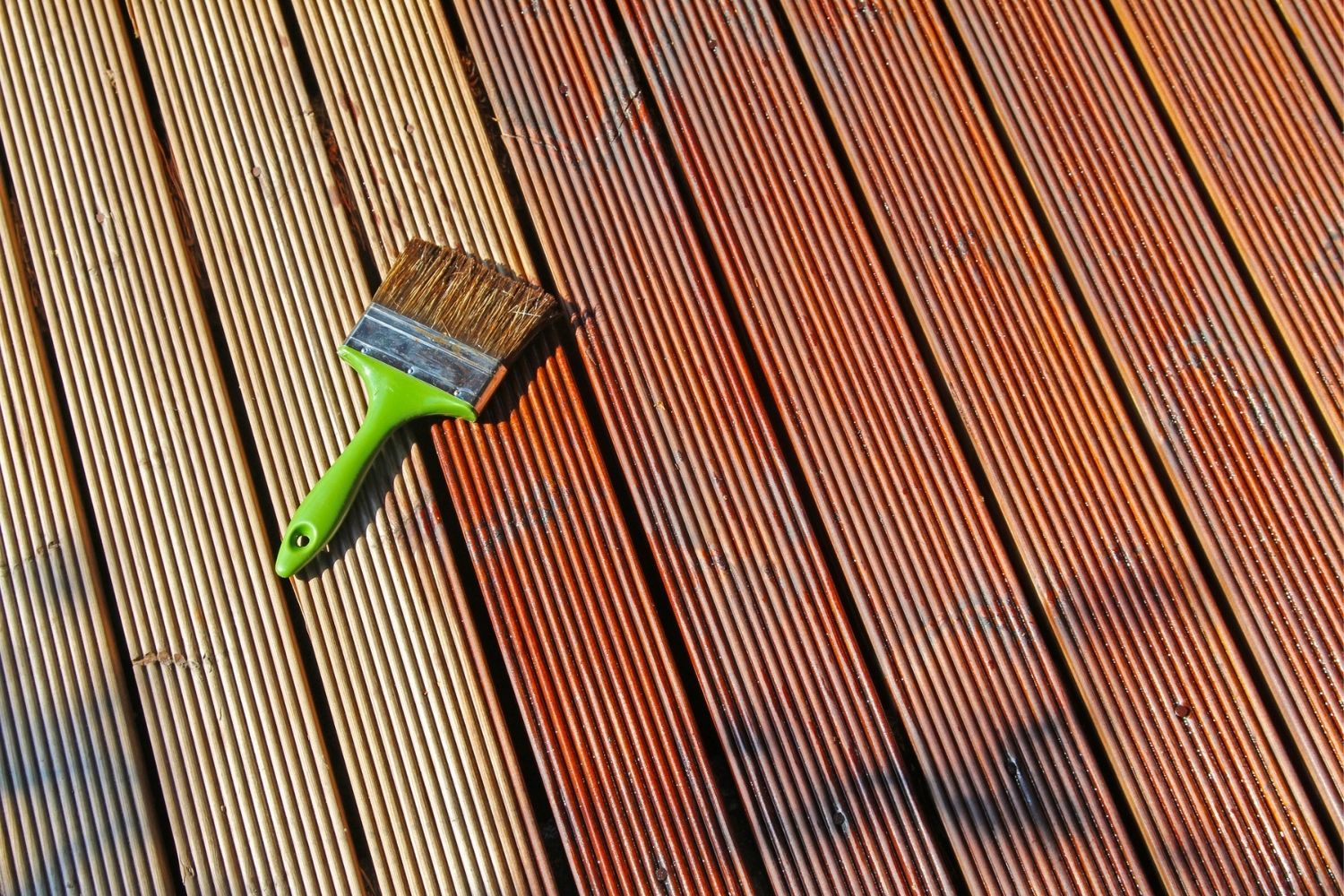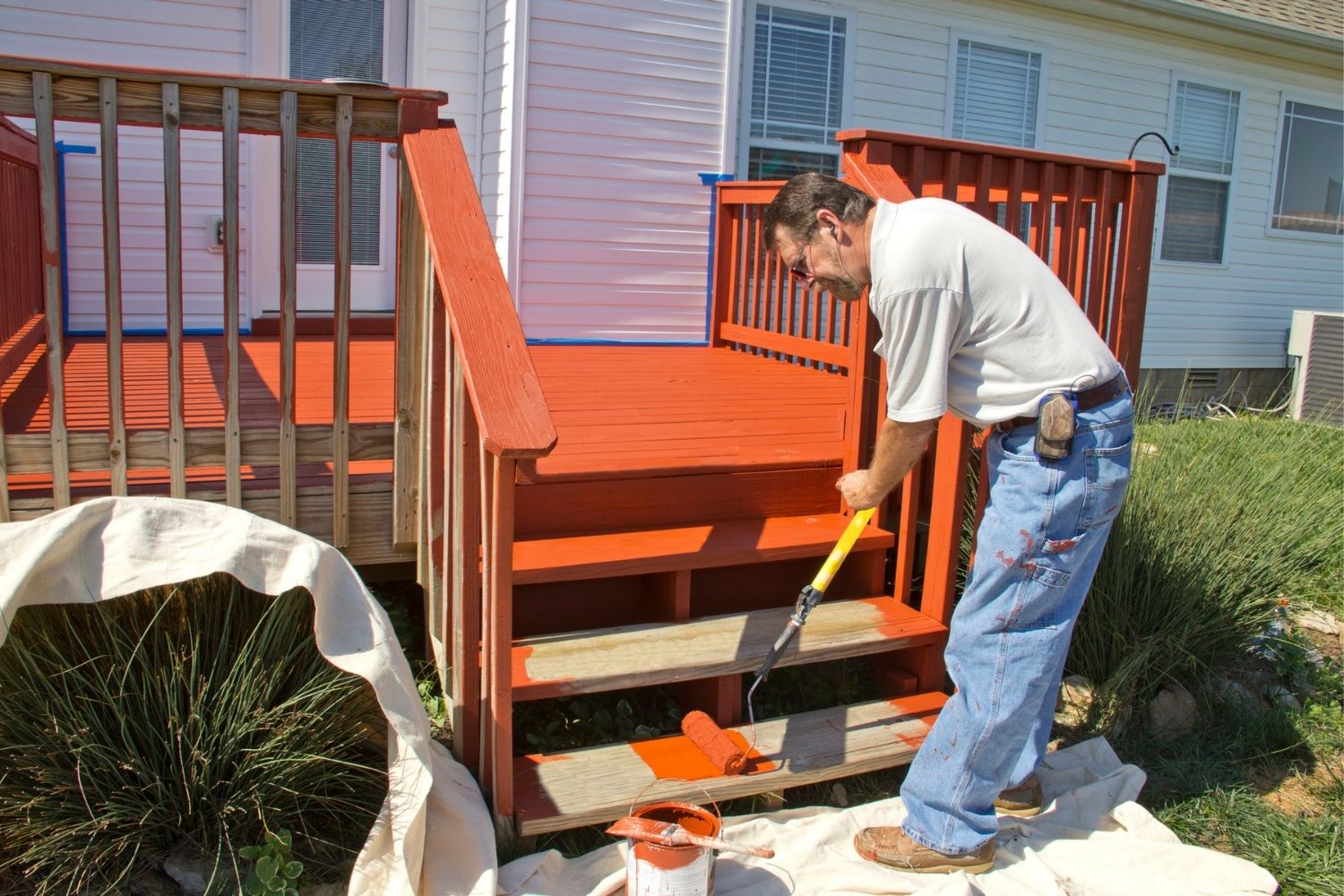We may earn revenue from the products available on this page and participate in affiliate programs. Learn More ›
Highlights
- The typical cost range to paint a deck is between $600 to $2,720, with a national average cost of $1,010.
- The main factors that affect the total cost of deck painting include the deck size, material, design, and condition; the type of primer and paint; the number of coats needed; the required prep work; and the cost of labor.
- Common signs a deck needs to be painted include chipped paint, minor cracks or splits, fading or discoloration, and water stains.
- Painting a small deck in decent condition can be a DIY project for a homeowner with the required skills and time. However, hiring a pro ensures the job will be completed correctly, efficiently, and on time.
Painting a deck can be a quick way to spruce up outdoor living space, but how much does the project cost from start to finish? There are several variables to consider, like a deck’s square footage, layout, and its current condition.
For an estimate that goes beyond the cost of a can of paint, it may help to know the national average deck painting cost is $1,010. Smaller decks or those that require less labor cost as little as $600 to paint, while larger decks or more labor-intensive jobs can cost as much as $2,720.
Key Cost Factors
Every deck is unique, which means there isn’t a one-size-fits-all answer to how much it should cost to paint a deck. The national average cost of painting a deck is $1,010, but when all the different variables are factored in, an accurate estimate can be determined before the job officially begins. This can help homeowners stay on task and budget.
Deck Size and Material
Square footage is a major factor when determining how much it will cost to paint a deck. A small 10-foot by 10-foot deck can cost between $200 and $500 to paint, while a much larger deck measuring 16 feet by 16 feet can cost between $500 and $1,500. On average, homeowners can expect to pay between $2 and $5 per square foot when painting a deck.
The deck material also plays a large role in painting costs. If a deck needs several boards replaced before painting can begin, material pricing can quickly add up, especially if a more expensive material is required or preferred. Pine or white wood are affordable deck material options that take paint well. Treated lumber is another material to consider that’s not much more expensive than untreated lumber, yet lasts years longer. Cedar and redwood are also both commonly used, albeit expensive, decking materials. Overall, decking materials cost between $20 and $45 per square foot.
Deck Design and Condition
A simple rectangular or square deck typically requires less prep, time, materials, and labor to paint compared to a more complex design, like a custom shape or one with curves. And if a deck has multiple levels, elaborate staircases, built-in seating, planters, or other architectural touches, a deck painting cost estimate is likely to increase even more. A deck staircase costs between $440 and $2,350 to install, while built-in bench seating averages between $500 and $800 per foot.
The condition of a deck greatly affects painting costs. A new deck is often already prepped for priming and painting, so it requires very little prep work or additional tools and materials. An older or weathered deck, however, may need to be stripped, sanded, or even have boards replaced before painting can begin. This will cost a homeowner more in materials and labor.
Primer and Paint Type
Primer closes the pores in the wood so that paint holds and looks better. Even though primer adds to the overall cost of a deck painting project, running between $15 and $30 per gallon, it’s a step that typically isn’t recommended to skip. Customers can expect to pay between $30 and $60 per gallon of deck paint.
Number of Coats
A single coat of paint can certainly be enough to adequately cover and protect a deck. But multiple coats may be required, depending on the deck materials, condition, and paint color. Particularly light or dark colors typically need additional coats to avoid looking streaky or patchy. Homeowners will want to determine how much paint they need if the deck requires additional coats, since the cost estimate will increase accordingly.
Prep Work
Prep work can quickly add to a deck painting project’s budget and timeline. This is especially true when it’s time to repaint deck boards. This process typically involves scraping away old paint; removing dirt, mold, or mildew; and sanding the surface. Homeowners may need to add the cost to power-wash a deck into their budget since a dirty deck won’t paint up as well as a clean one. Boards may also have to be replaced and railings may have to be repaired, all of which can quickly increase a painting project estimate. Not all paint and deck staining companies provide repair services, so check if this is included in any deck painting cost proposals being considered if you suspect any areas of your deck need repair.
Labor and Geographic Location
Time comes at a price. The larger or more difficult the deck painting job, the more labor is likely to cost. This is especially true if repairs are needed. The cost of labor doesn’t just include the time spent painting but also the site setup, prep work, and cleanup.
Material shortages can affect different geographic locations at different times, causing the same materials to cost more in certain areas compared with others. If a deck painting job isn’t time-sensitive and deck material prices are higher than usual, consider putting off the job until prices even out, especially in areas experiencing material shortages. It’s also important to consider that no matter the state of the supply chain, some projects will be costlier in more densely populated suburban or urban areas due to a higher cost of living and subsequent higher labor prices.
Time of Year
Depending on your region of the country, not all of Mother Nature’s seasons are ideal for deck painting. For example, if cold weather makes it too difficult to paint decks 6 months out of the year, prime prices can be expected when materials and labor are in demand. At the same time, timing out a deck painting job with seasonal sales can help lower the overall cost.

Additional Costs and Considerations
So, how much to paint a deck? It’s difficult to pinpoint before starting a deck painting project. But there are a few additional costs and considerations to take into account when estimating a budget.
Paint vs. Stain
Choosing between painting versus staining a deck will affect project costs. A gallon of stain can be as inexpensive as $20 (or even less through a deck staining company with access to industry prices). Not only is the cost to stain a deck lower, but a gallon of stain also tends to go farther than a gallon of paint. Both of these reasons make stain a budget-friendly option. Paint may cost more during the initial stages of a deck project, but it tends to last longer and require less maintenance than stain. This could actually make it the more affordable option in the end. When searching for “deck staining companies near me,” ask what route each professional recommends based on your budget and expectations.
Deck Repair
If a deck is showing signs of rot, has structural problems, or is not up to current code (for example, railing spacing requirements may have changed), it can be expected that overall costs will rise. How much will depend on the scope of repair. Replacing a few boards will be much more affordable than funding an entire new deck build.
Customizations
A deck doesn’t have to be a flat, desolate wooden structure; the space can be completely customized. But keep in mind that dream decks come with a higher price tag. Elements like lighting, wire accents, built-in seating, fire features, cooking areas, pergolas, and screened-in dining areas will add to a project’s budget, even if they don’t require additional paint.

Types of Deck Paint
The type of deck paint chosen will have an effect on the overall cost of painting a deck. There are two main types of deck paint, each with its own unique pros and cons. Browse below to find the best deck paint options for a deck painting project.
Oil-Based
Homeowners who are trying to stick to a budget will want to consider oil-based paint. This type of paint has been a popular choice for decades and is often more affordable per gallon than a water-based product, starting at around $30 per gallon. It’s tough and durable, making it ideal for outdoor spaces.
Depending on wood quality and how the surface was prepared before application, oil-based paint can last up to 10 years. Compared to water-based paint, oil-based paint better protects wood from moisture to prevent rotting.
Water-Based
Water-based paints cost about 25 percent more than oil-based options and are available in both acrylic and latex varieties in a multitude of colors. Though water-based paint will increase the cost of deck painting, this type of paint offers several advantages.
They’re also less likely to fade, crack, or peel, making them the ideal choice for harsher climates. They’re also easier to clean up. Brushes and rollers quickly come clean with just soap and water. Water-based paints also dry faster than oil-based ones.
It should be noted that water-based paints can last up to 8 years—slightly less than oil-based. This makes them not only more expensive during initial application but also when it comes to maintenance and upkeep.

Do I need to paint my deck?
Debating whether a home’s deck is in tip-top shape or if it’s begging for a fresh coat of paint can be frustrating. Look for any of the following signs that a deck is in need of some upkeep.
Chipped Paint
If the paint on a deck is beginning to chip, the problem is likely to only get worse with time. Chipped paint allows the wood beneath to be exposed to moisture, which can lead to rot. Patching the chipped areas with fresh paint is rarely aesthetically or functionally successful.
Minor Cracks or Splits
If any of the wood begins to crack or split on a deck, it likely will need to be repainted sooner than later. Repairing or replacing damaged boards is one of the most crucial steps of the deck painting process. Ignoring cracks or splits can quickly result in an unsafe structure.
Fading or Discoloration
When faded or discolored areas start to freckle a deck, the elements could already be wearing down the deck. These unsightly spots are signs of aging that can’t just be painted over. The entire painting process, including scraping and sanding, should be completed.
Water Stains
Water will bead on a properly painted and sealed deck surface, acting as a type of deck waterproofing. When water stains are present, there could be a simple culprit, like a leaking gutter or dip in the wood that’s collecting rainwater. If there’s no obvious sign of where the excess water is coming from, the deck likely needs to be repainted. This should be completed quickly, as standing water can develop mold and accelerate rotting.

DIY vs. Hiring a Professional
Painting a deck is a big job with lots of steps. Even the most in-depth tutorials can’t equate to years of on-the-job experience a professional brings to the table, and DIY mistakes can cost time and money. For example, prep and repairs are often the first steps required in a deck painting job. A novice may cut boards to the wrong length or shorten the life of the paint job by not sanding enough. If inexperienced in deck repairs, start a deck painting project with a search for “deck refinishing near me.” The cost of deck repair isn’t as much as one might think.
It’s true that labor costs associated with professionals can add up. But there are plenty of ways to save by hiring an experienced team to paint a deck as well. Materials are more likely to be bought in bulk, lowering the overall cost of a project. Professional deck painters also have all the tools required for the job. Once the painting is completed, the savings offered by a professional can continue. A properly painted deck will require less maintenance down the line, giving a homeowner more time to enjoy their deck rather than spending weekends repairing and updating their outdoor space.
Reaching out to a professional for a deck evaluation can expose problems or solutions that would have otherwise been overlooked. When you consider the experience, accessibility to materials and tools, and the speed a professional brings, hiring out can make more financial sense than a DIY approach.
How to Save Money
Painting a deck doesn’t have to be extravagantly expensive. There are ways to cut down on costs.
- Choose decking materials wisely. Consider longevity and initial cost. Buying more expensive materials today that can withstand the test of time can save money tomorrow.
- Look for dented cans or discontinued paints. These options may be marked down and can be a great way to save money, especially if paint color is negotiable.
- Consider renting tools. If you’re doing some or all of the work yourself, renting tools instead of buying them up front can save money. Borrowing tools from family members or friends is an option. Hiring a professional entirely eliminates the need to track down tools.
- Prepare the deck properly. To extend the lifespan of a deck painting job, check on any necessary prep work. A properly prepared deck will take paint better, extending the life of the paint job and saving money in the long run.
- Consider DIYing some of the work. When working with a professional, ask if completing a portion of the prep or cleanup work is an option. This may reduce labor costs.
- Opt for staining. If painting isn’t an affordable option right now, don’t let a deck fall into disrepair. Find out the price for power washing and staining a deck, which is likely to be more affordable than painting. This will still protect the deck and painting can take place when the budget allows.

Questions to Ask a Pro
Hiring a contractor to paint your deck saves on time and frustration. Asking the right questions, including the following, can help ensure that you and the professional you hire are on the same page.
- Do you have insurance?
- Do you have an up-to-date business license?
- Do you conduct background checks on your employees?
- How many employees will be performing the job?
- How long do you anticipate the job will take?
- What kind of deck materials are you experienced with?
- Can you repair my deck before painting it, if necessary?
- How do you handle unforeseen repairs not included in the original proposal?
- Can you recommend materials and colors that will increase the value of my deck?
- Who will be managing the project?
- What type of training do your employees receive?
- Do you have references?
- Do you have a portfolio of past projects?
- Are you a member of the Better Business Bureau?
- Do you include a warranty or guarantee, and if so, what is the cost and what is included?
- How long should a freshly painted deck last, and what can I do to preserve my investment?
- Are there any weather conditions to consider when scheduling deck painting?
FAQs
Preserving and beautifying a deck with a fresh coat of paint is a smart investment for any homeowner. Get answers to any last minute questions below before reaching out to a professional deck painter.
If a deck is in good condition, it’s certainly worth maintaining (or improving). One of the best ways to prevent rot and deterioration is to paint a deck. Not only is painting a deck an investment in outdoor living space, but it’s also aesthetically pleasing and great for resale value. Even if moving isn’t on the agenda, the ambience of a maintained outdoor living space and the preservation qualities a painted deck brings make the project beneficial.
Painting seems like a straightforward task, but technique and strategy are required to take an adequate paint job to a standout out. A professional deck painter brings plenty of knowledge and experience to a deck painting job. They’ll be better equipped to handle surface preparations, which affect the overall success of any deck painting job. They’ll also have access to and experience with quality materials and tools, understand the proper applications and processes, and be better equipped to handle unforeseen circumstances that may pop up. A professionally painted deck is also easier to maintain and will often outlast a DIY job. To find out more about hiring a pro for a deck painting project, search online for “deck painting near me.”
Staining is more affordable when it comes to materials; paint can be almost twice as expensive per gallon compared with stain. Painting may also require additional materials, like primer and wood preservative. The best deck stains are also easier to apply and have a natural appearance. To save money initially, having a professional stain the deck is an option. (You can start by searching for “deck staining near me” or “deck cleaning and staining near me” if the deck surface is in need of additional prep work.) But for the homeowner looking to get the most out of preservation with the least amount of maintenance, painting is the better option.
No, an old deck cannot be simply painted over. Whether the deck paint is chipping or is in dire need of an aesthetic color change, the wood needs to be scraped, repaired, and prepped for new paint. This is why it is typically recommended to test new paint on a small section of a deck before painting the entire surface. However, a stained deck can usually be painted over with minimal prep work.
Deck paint can last up to 10 years. Its longevity is affected by every step of the application process, from scraping to second coat. This is why having a professional paint a deck can save money in the long run. A properly applied paint job will always last longer than an inadequate application. Routine maintenance will also extend the life of a deck paint job.
Deck paint can peel for multiple reasons. First, poor quality paint has a shorter lifespan. Better- quality paint can last longer, but it’s more likely to peel if poorly applied or painted onto dirty or wet wood. This is why it’s so important that the right materials are always used when prepping and painting a deck, including a scraping tool, sandpaper, and a brush or roller, to increase a deck paint’s longevity. One of the best deck sealers applied on top of the paint may also help prevent peeling.
Angi, HomeAdvisor, HomeGuide, Fixr

